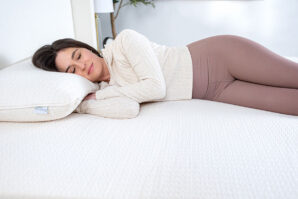It’s only May, but in many parts of the country it is already quite hot. While this might be nice for outdoor activities and pool schedules, it can be tough on people’s sleep. That’s because almost all of us require a cool room to get the best sleep we can. When your bedroom’s ambient temperature is too hot, your body has trouble falling asleep and you tend to have a more restless night. But a cool temperature helps you fall asleep faster and get a deeper sleep. In this article we’ll discuss why that is, and all the ways that you can keep your bedroom cool as the summer heats up.
The Role of Body Temperature in Sleep
Our bodies follow a natural circadian rhythm that regulates various physiological processes, including body temperature and sleep-wake cycles. As evening approaches, our core body temperature naturally begins to drop, signaling that it’s time to prepare for sleep. This drop in temperature helps facilitate the onset of sleep and promotes deeper, more restful slumber.
Optimal Sleeping Temperature
The ideal bedroom temperature for sleep is generally considered to be between 60-67°F (15-19°C). This range helps align with the body’s natural temperature regulation process, creating an environment that supports the body’s efforts to cool down. When the room is too warm, it can interfere with this process, making it harder to fall asleep and stay asleep.
Improved Sleep Quality
Sleeping in a cooler room can enhance various aspects of sleep quality, for instance:
- Faster Sleep Onset: A cooler environment can help you fall asleep more quickly by promoting the natural decline in body temperature.
- Deeper Sleep: Lower temperatures support deeper stages of sleep, including slow-wave sleep (SWS) and rapid eye movement (REM) sleep, both of which are crucial for physical and mental restoration.
- Reduced Wakefulness: Cooler room temperatures can decrease the likelihood of waking up during the night, leading to more continuous and uninterrupted sleep.
Physical Comfort and Thermoregulation:
When sleeping in a cool room, the body doesn’t have to work as hard to regulate its temperature, allowing for a more comfortable and relaxed state. Overheating, on the other hand, can cause discomfort, sweating, and restlessness, disrupting the sleep cycle and diminishing sleep quality.
So, we can’t overstate the importance of keeping the room cool when you go to bed. But how can you do this when it’s getting hotter and hotter outside?
How To Keep Your Bedroom Cool As Summer Heats Up
With a few adjustments to your sleeping environment and habits, you can achieve a comfortable and restful night’s sleep. Here are some effective ways to stay cool during those hot summer nights:
Adjust Your Bedding
- Lightweight, Breathable Sheets: Use sheets made from natural fibers like cotton or linen, which are breathable and wick moisture away from the body. Our organic cotton sheets are light and breathable for summer sleep.
- Cooling Mattress Toppers: Invest in a cooling mattress topper made from breathable materials (like our organic latex topper) to regulate temperature.
- Cooling Pillows: Choose pillows designed to stay cool, such as our charcoal-infused organic latex pillow, or a pillow filled with organic buckwheat or other cooling materials.
Improve Air Circulation
- Fans: Use fans to improve air circulation in your bedroom. Ceiling fans, box fans, or oscillating fans can help create a cooling breeze.
- Cross Ventilation: Open windows on opposite sides of your home to create a cross breeze. This allows cooler evening air to circulate through your room.
- Exhaust Hot Air: Use a window fan facing outwards to expel hot air from your room, especially if the outside temperature drops at night.
Optimize Your Sleeping Environment
- Keep Blinds and Curtains Closed: During the day, keep blinds and curtains closed to block out direct sunlight and reduce heat buildup.
- Sleep in a Cooler Room: If possible, sleep in the coolest room of your house. Basements or rooms on lower floors are often cooler than upper floors.
- Use a Dehumidifier: Reducing humidity levels can make the air feel cooler and more comfortable.
Cool Your Body
- Take a Cool Shower: A cool shower before bed can lower your body temperature and help you feel more comfortable.
- Cooling Packs: Use ice packs or cooling gel pads on pulse points like your wrists, neck, and ankles. Alternatively, fill a hot water bottle with cold water and place it in your bed.
- Hydrate: Drink plenty of water throughout the day to stay hydrated, but avoid large amounts right before bed to prevent nighttime trips to the bathroom.
Choose the Right Sleepwear
- Lightweight, Breathable Fabrics: Wear lightweight, loose-fitting sleepwear made from natural fibers like cotton. Avoid synthetic materials that can trap heat.
- Sleep Naked: If comfortable for you, sleeping naked can help your body stay cooler by allowing heat to escape more easily.
Bedtime Routine Adjustments
- Use a Damp Cloth: Place a damp washcloth or small towel on your forehead or other pulse points to cool down.
- Avoid Electronics: Turn off electronics well before bedtime. Devices like laptops, phones, and TVs can emit heat and disrupt your sleep.
Long-Term Solutions
- Insulate Your Home: Improve the insulation in your home to maintain cooler indoor temperatures during summer.
- Install an Air Conditioner: If feasible, install an air conditioner or a portable AC unit to keep your bedroom at a comfortable temperature.
- Plant Shade Trees: Consider planting shade trees or using exterior shading solutions like awnings to reduce the heat entering your home.
By implementing these strategies, you can create a cooler sleeping environment and enjoy more restful nights even during the hottest summer months.









